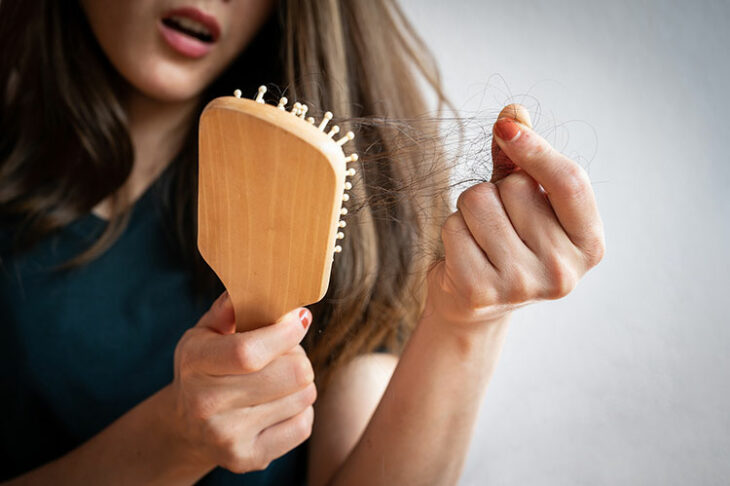By Julia Green
Has your hair been struggling since you contracted COVID?
By this time, many of us have had at least one run-in with the Rona. I have had many clients in my chair express concerns about dry, brittle and shedding hair, or even substantial hair loss, after experiencing COVID.
Hair shedding or loss after COVID generally is caused by telogen effluvium, a condition in which hair sheds in response to a stressor. Telogen effluvium, the most common type of generalized hair loss, can be triggered by viruses and may be a side effect of certain medications, nutritional deficiencies, hormonal abnormalities or stressful events.
So how do you address post-COVID hair loss or shedding and improve your overall hair health? Here are some helpful facts and tips:
Don’t be alarmed. Telogen effluvium, whether caused by COVID-19 or another trigger, usually isn’t permanent. Shedding can occur for three to six months. The best thing you can do is wait it out and know that your body is in the process of regulating itself.
Stress usually is the biggest culprit when it comes to hair loss — with or without COVID. Take steps to reduce your stress whenever possible, and take time to care for yourself.
Do everything you can to minimize the risk of losing any more hair. Take a hiatus from heat styling. Switch to less damaging chemical services, and avoid tight hairstyles that put tension on the hair.
If hair loss and shedding persist for more than three to six months, please schedule a blood panel appointment with your physician or dermatologist to check for nutritional and vitamin deficiencies or hormonal imbalances, or ask about medical treatments for chronic telogen effluvium.
If you’ve dealt with post-COVID hair loss or shedding, know that you’re not alone.
FACTS ABOUT COVID AND HAIR LOSS
- According to one 2020 study in the Journal of the European Academy of Dermatology and Venereology, approximately one in 10 people infected with COVID-19 experienced hair shedding after the fact. Another study in the Lancet estimated that 22 percent of patients who were hospitalized with COVID experienced hair loss after their illness.
- It’s normal for patients to lose about 100 hairs a day. However, with telogen effluvium, patients could lose up to 300, 500 or even 1,000 hairs per day.
- According to some experts, someone may be completely recovered from COVID before noticing hair loss. They note that telogen effluvium typically doesn’t happen at the same time as the triggering event, so effects on the hair may not happen until two to three months later.
Julia Green is owner of LaBella’s Salon in Gulfport. Reach her at jgreen1472@icloud.com.



